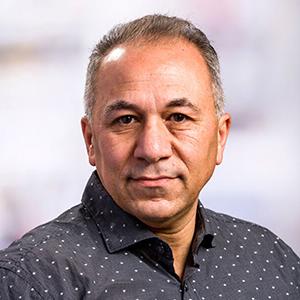Novel Immunotherapeutic Development in Childhood AML

Soheil Meshinchi
PhD, MDFred Hutchinson Cancer Research Center
Project Term: October 1, 2020 - September 30, 2022
Dr. Soheil Meshinchi is taking a personalized medicine approach to identify immunotherapies for specific subsets of pediatric acute myeloid leukemia (AML). Pediatric AML remains a devastating disease with only a 60% survival rate. Survivors often have long-term quality of life issues related to the toxic chemotherapy used to treat their disease. A better knowledge of the molecular basis of pediatric AML will help identify targets for therapeutic intervention. Some of these targets may be mutants of normal genes, while others may be overexpression of normal genes, which would provide a therapeutic window in which targeting the overexpressed gene product may preferentially kill tumor cells. Dr. Meshinchi has surveyed the gene expression spectrum of pediatric AML and has identified several targets which are overexpressed in pediatric AML. One protein, CD74, is highly expressed in a subset of AMLs. Another target is CD70, which is highly expressed in about half of all pediatric AML cases that include a fusion of the MLL protein. Patients with MLL fusions have a worse outcome. Lastly, some infant AML patients have another kind of fusion protein paired with overexpression of the FOLR1 protein. All three proteins that Dr. Meshinchi has identified as being highly expressed in subsets of pediatric AML have much lower expression in healthy cells. Therefore, targeting these proteins is a logical choice. These three proteins are all expressed on the surface of the cell, making them accessible to targeting by special therapeutic antibodies called “antibody drug conjugates” (ADCs). ADCs have a toxic payload attached to them. When the antibody binds to its target on the cell surface, the cell takes in the ADC releasing the toxic payload, which then kills the cell. This immunotherapy approach is a highly specific, personalized approach for treating cancer. ADCs to each of the protein targets identified by Dr. Meshinchi are being clinically evaluated in other diseases, providing the opportunity to potentially repurpose those drugs for pediatric AML. Therefore, Dr. Meshinchi proposes to evaluate these ADCs in laboratory models of pediatric AML. Should any of these drugs show promise in these laboratory models, Dr. Meshinchi will propose clinical trials in pediatric patients through LLS’s Pediatric Acute Leukemia (PedAL) Master Clinical Trial. If any of the targets do not have an effective drug in the laboratory models, Dr. Meshinchi will create new ADCs using proven expertise currently available in his laboratory. Therefore, these studies present the possibility of new, targeted immunotherapy for specific subsets of pediatric AML patients, either rapidly through drug repurposing, or through the development of new ADCs. The goal is to improve the survival and quality of life for these vulnerable blood cancer patients.
Dr. Soheil Meshinchi is taking a personalized medicine approach to identify immunotherapies for specific subsets of pediatric acute myeloid leukemia (AML). Pediatric AML remains a devastating disease with only a 60% survival rate. Survivors often have long-term quality of life issues related to the toxic chemotherapy used to treat their disease. A better knowledge of the molecular basis of pediatric AML will help identify targets for therapeutic intervention. Some of these targets may be mutants of normal genes, while others may be overexpression of normal genes, which would provide a therapeutic window in which targeting the overexpressed gene product may preferentially kill tumor cells. Dr. Meshinchi has surveyed the gene expression spectrum of pediatric AML and has identified several targets which are overexpressed in pediatric AML. One protein, CD74, is highly expressed in a subset of AMLs. Another target is CD70, which is highly expressed in about half of all pediatric AML cases that include a fusion of the MLL protein. Patients with MLL fusions have a worse outcome. Lastly, some infant AML patients have another kind of fusion protein paired with overexpression of the FOLR1 protein. All three proteins that Dr. Meshinchi has identified as being highly expressed in subsets of pediatric AML have much lower expression in healthy cells. Therefore, targeting these proteins is a logical choice. These three proteins are all expressed on the surface of the cell, making them accessible to targeting by special therapeutic antibodies called “antibody drug conjugates” (ADCs). ADCs have a toxic payload attached to them. When the antibody binds to its target on the cell surface, the cell takes in the ADC releasing the toxic payload, which then kills the cell. This immunotherapy approach is a highly specific, personalized approach for treating cancer. ADCs to each of the protein targets identified by Dr. Meshinchi are being clinically evaluated in other diseases, providing the opportunity to potentially repurpose those drugs for pediatric AML. Therefore, Dr. Meshinchi proposes to evaluate these ADCs in laboratory models of pediatric AML. Should any of these drugs show promise in these laboratory models, Dr. Meshinchi will propose clinical trials in pediatric patients through LLS’s Pediatric Acute Leukemia (PedAL) Master Clinical Trial. If any of the targets do not have an effective drug in the laboratory models, Dr. Meshinchi will create new ADCs using proven expertise currently available in his laboratory. Therefore, these studies present the possibility of new, targeted immunotherapy for specific subsets of pediatric AML patients, either rapidly through drug repurposing, or through the development of new ADCs. The goal is to improve the survival and quality of life for these vulnerable blood cancer patients.